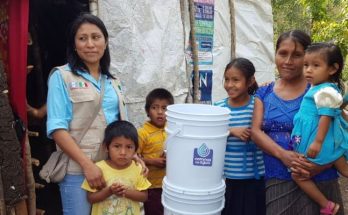By Kathleen Bohné for San Miguel Life (www.sanmiguellife.com)
The strength of a community is best measured in times of crisis. In March 2020, the COVID-19 pandemic reached San Miguel de Allende and the public health and economic effects were painfully felt. Businesses closed their doors—many of them permanently—and had to lay off their employees. In an economy sustained by tourism, the crisis impacted everyone and was devastating for the poorest.
But San Miguel showed a heartening resilience in the face of unprecedented loss and uncertainty as locals and expatriates came together and acted quickly to aid those most in need. Food and household necessities were collected and donated to families who had lost everything by a grassroots group called Amigos al 100, started by local businesswomen.
A group of medical professionals formed a Facebook group, COVID-19 SMA, which has been an invaluable information resource on everything from testing to finding oxygen for the sick, as well as a provider of translation services and logistical support for the vaccination brigades. These are just two examples of the solidarity and generosity shown by citizens, able to quickly form a safety net for their fellow sanmiguelenses.
“I was so impressed by how quickly Guadalupe Álvarez (owner of Penzi Weddings) and Myrna Montes (founder of Amigos al 100) responded and organized,” remembers Nancy Howze, who is a donor to and advocate for Amigos al 100. In its first six months of existence, the group had collected and distributed 28,850 “despensas” (essential provisions) to more than 6000 families in San Miguel and they continue their work today.
“In my twenty-five years living here, I’ve always seen charitable organizations as an integral part of the community. As expatriates, many of us work to give back to a town that has been so gracious to us,” says Ann Dolan, who has volunteered and financially supported many NGOs in the city, including La Biblioteca Pública SMA, Feed the Hungry, the Red Cross and IREE (school for the deaf).
“There are over 100 NGOs in San Miguel, the beauty of this is that there is something for everyone depending on your interests and passions. It’s a wonderful way to meet people and I think there’s a very nice relationship between the foreigners and locals working together. We can all learn from each other.”
The expatriate community in San Miguel has a long history of engagement in civil society. Some of the NGOs have been operating since the 1970s and many were founded by retired Americans, Canadians and Europeans who made the town their adoptive home. Civil society groups—from environmental to human rights advocacy–have grown nationwide over the last thirty years, but still face an uphill struggle to receive funding and resources.
San Miguel is a model for the benefits that these NGOs can provide by helping lift citizens out of poverty, addressing environmental issues and improving public health.
“I have seen in my work with charities in San Miguel that we make a direct impact on people’s lives, by empowering them,” says Amber Nieto, who began volunteering in 2012 with Casita Linda (an organization that builds homes in low-income areas).
“My volunteer work turned into a job at Casita Linda for seven years, and now I can’t imagine not being active in a local NGO.” Amber is on the advisory board for Casita Linda and also serves on the board of Mano Amiga, providing micro-loans to local female entrepreneurs.
San Miguel charities can be found enriching many areas of city life: providing free ambulance service to the populace, organizing mass sterilization campaigns of dogs and cats, bringing world-class performers to San Miguel venues.
Some have broadly trained teams working closely with municipal and state governments, such as Caminos de Agua, a non-profit whose mission is to improve access to clean, safe drinking water in SMA and the surrounding communities.
Others are more specialized, serving a small segment of the population, like Opera de San Miguel, whose mission is to give the most talented rising opera singers in Mexico the opportunity to receive world-class training.
Most of these NGOs are operated by a mix of Mexican and foreign nationals, and now more than ever, a mix of generations. Some of the oldest active NGOs were founded by expatriate retirees.
“One of the reasons I think we have so many charities in San Miguel is that a lot of people who moved here from other places led active professional lives and they wanted to continue to be busy in retirement. They have the time, energy and interest,” notes Nancy. As younger expatriate families have moved to San Miguel over the last 15 years, their participation in civil society has grown.
“I’ve been lucky to serve as a kind of cultural translator between the boards and donors of NGOs–who are often expats–and locals. My goal is to make sure the mission of an organization is matching up with the community’s needs: this is how to make a real difference,” says Amber, who also emphasizes how much she has valued developing professional and personal relationships with people many years her senior.
“I learn so much from all the people I’ve worked with on non-profit boards, they have been my mentors. Many of them were (or still are) at the top of their professional fields. When I look around the room at a board meeting of Mano Amiga, I just think how special it is to work with this group of powerhouse women.”
“Educating our children about how to give back to their communities is so important, and one of my favorite experiences demonstrating this was a Walk-a-Thon that we organized at my kids’ school years ago,” says Ann. “The kids collected pledges from family and friends to raise money for new equipment at the playground at Parque Juárez. The walk started at our school and ended in Parque Juarez, where the cheque was presented by the kids to Amigos del Parque. It was all about creativity and community.”
Amber agrees that participation in civic life through non-profits is happening at all ages. “Many mothers I know are involved in charities here, and I feel the giving nature of this community is passed on to our children. When my daughter Maddie was in first grade, she decided to set up a lemonade stand to raise money for a local cat shelter. In 2018, she was named president of Kids for Casita Linda and with a group of her peers, helped to paint houses.”
Fundraising events have become a key part of the San Miguel social calendar. “We all like to have the opportunity to give back and I found Patronato Pro Niños to be a very worthy cause. But selfishly, I also got so much out of the experience of organizing their event, I expanded my social circle and met people I probably wouldn’t have met otherwise. It was just a win-win all the way,” remembers Nancy, who helped put on a fundraising auction in 2004 that raised $168,000 USD for the non-profit, which provides medical, dental and psychological care for children in need.
“I’m really proud of my work on the annual Spirit of Hope gala fundraiser for Casita Linda, it has become one of the most successful charity events in San Miguel,” says Amber. “It’s really one of the highlights of my year, getting to put on and enjoy a memorable event while raising money for a great cause.”
The future for NGOs in San Miguel looks bright as an increasingly diverse population brings more talent, ideas and innovation.
“The people of San Miguel—foreigners, Mexicans—have always been grateful for our services when they’ve required of them,” says Leticia Fernández de Noyola, the president of La Cruz Roja San Miguel de Allende, which attends 97% of medical emergencies in the city.
“Many of those who have benefited from La Cruz Roja have contributed to it by donation, as much as they are able. With our group of American supporters, Friends of the Red Cross, we join forces, bringing all our ideas together so we can keep improving our services.”
Our shared love for San Miguel, whether native born or newly arrived, has cultivated a truly resourceful, engaged and open-hearted community.




